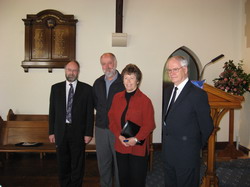Part 1 – 1952
Dorothy – 13/08/04
New Zealand has been peopled by immigrants since Maori arrived in the thirteenth or fourteenth century. European settlement began with the whalers, sealers, traders and missionaries and a settlement was established in the Bay of Islands in the 1820s. In 1840 with the signing of the Treaty of waitangi New Zealand became a British colony. Immigration has continued ever since. The discovery of gold in Otago in 1861 brought a flood of immigrants.
From 1861 to 1865 total arrivals exceeded departures by 93,000. Immigration slowed markedly when the gold boom ended, but in the 1870s assisted immigration resultedin another increase of 136,760 immigrants.
From 1881 to the end of World War 2 the number of immigrants was generally low, though assisted immigration in the 1920s increased the arrivals until the onset of the Depression caused the assistance to immigrants to be cut. In 1947 an assisted/free passage scheme was introduced for ‘suitable’ immigrants from Britain and in 1950 the policy was further liberalised to include young non-British European migrants. Since 1940 New Zealand has gained over 800,000 people.
Government policy on immigration has changed many times since 1950, but the most noticeable change in the population has been the increase in the number of Pacific Islanders and the recent increase in Immigrants from Asia. The flow of immigrants has brought enrichment and variety to New Zealand’s life and culture.
A recent NZine article included comments from recent immigrants to this country. Over the next two months NZine will feature the views of a number of people who moved here in the fifty years following World War 2.
Marrying a Kiwi brought today’s interviewee to New Zealand A contributor to NZine who wishes to be known only as “Settled” came to New Zealand in 1952 after marrying a New Zealander. Her husband’s training meant that New Zealand was the best place for him to work, so once she got here she didn’t really have any option to change. She says she has had no incentive to consider the relative merits of life in different places, but is happy to share what she sees as some of the good aspects of New Zealand life.
“I have lived in England, Australia and New Zealand, in a large city (Sydney) and in the middle of a forest of 22,000 acres (Waipoua). I have travelled in Europe and Asia, and lived briefly in Kathmandu. In my experience, there are advantages and drawbacks whereever you are. It is best to make the most of the opportunities each situation offers, enjoy what the locals enjoy, and adapt to cope with the difficulties.
“In a community where salaries are high, costs are often high, long hours of work are required, social expectations are high – ‘keeping up with the Joneses’ is demanding. These high salaries may be accompanied by very low incomes for a section of the community, so that housing, nutrition, health and education are quite inadequate. I am more comfortable where most people have enough for good development physically, educationally, morally and socially. New Zealand has done fairly well in this, which makes it a pleasant, friendly country.
“New Zealand has a moderate maritime climate, a small population with space for all, a pace of life which allows for recreation, hobbies and family time, easy access to outdoor activities such as skiing, tramping,surfing, diving, fishing, hunting, yachting, kayaking, birdwatching – an endless variety. There is great variety also in the type of country and scenery within easy distance. In Australia, there are long monotonous distances between A and B. It is farther from Sydney to Perth than from Sydney to New Zealand.
“For those who enjoy city life, there are cities of various sizes with world standard cultural activities – orchestras, theatres, museums, choirs, ballet, national cultural groups ……
“A good education is available to everybody, though a few special cases need extra effort.
“New Zealand’s geographical isolation (and the vigilance of border control) has the advantage that many pests have been kept out, including snakes, leeches and most poisonous spiders, which makes bushwalking and gardening much more relaxed. Pollution is minimal, compared with the Old World. However, with modern communications, it is possible to live here and be in touch with any part of the globe as closely as you wish or need. Air travel can take you anywhere in a couple of days at most.
“One of the characteristics of New Zealanders which I like is the networking which goes on, to meet a wish for developing an interest group, to fill a gap in the local amenities, to help someone along. Many and varied groups take the initiative instead of waiting for someone else or the Government to do everything.
“To return to my starting point, I can live happily in many places, but New Zealand has a lot going for it.”
Related Articles
- Newly married Dutch engineer and English school teacher chose immigration to New Zealand
- Roger and Daphne immigrated to New Zealand from Britain in 1962
- Tony served in the New Zealand army, then created a career working with computers
- Changing countries for a husband’s career can mean major changes for his wife
- Recent migrants comment on living in Christchurch, New Zealand – the advantages and the disadvantages




